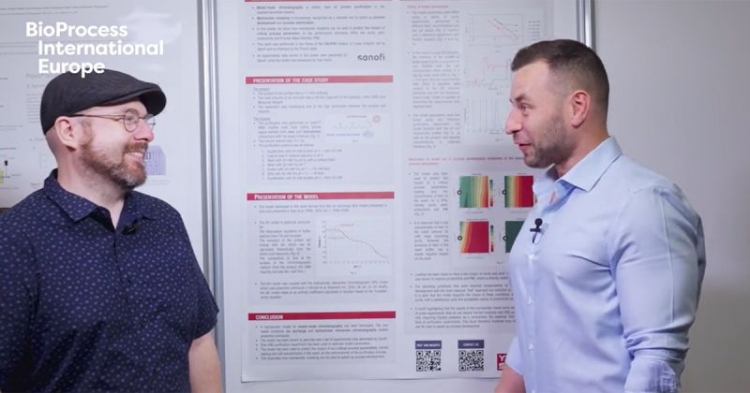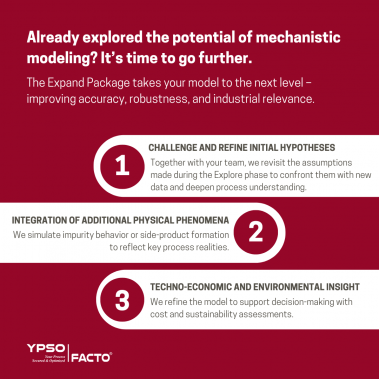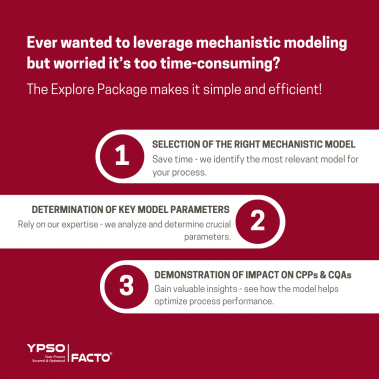- January 22, 2026
What’s new in Ypso-Ionic®?
Ypso-Ionic is a reference software for computing the purification of biomolecules, oligonucleotides and peptides by chromatography. The charge of such molecules depends on pH, which is a key aspect to consider for running simulations. Ypso-Ionic now allows you to compute this dependency within a...
- December 01, 2025
We’re thrilled to announce the release of Ionic 25.2.49!
This update brings a range of improvements to our chromatography simulation software Ypso-Ionic®, but this post highlights one feature requested from the process development community:Fraction Combination Made SimpleIn purification projects, analyzing numerous fractions can be time-consuming....
- August 13, 2025
Interview with BioProcess Insider – Modeling to Accelerate Downstream Development
Following Ypso-Facto’s Best Poster Award at BioProcess International Europe, our Co-CEO Edouard Nicoud spoke with BioProcess Insider editor Joshua Abbott about how mechanistic modeling can accelerate downstream process development — with a focus on mixed-mode chromatography. The discussion...
- June 02, 2025
Interview : « L'expertise humaine est un précieux outil pour évaluer la fiabilité d'un modèle » (French)
Dans un article récemment publié par L’Usine Nouvelle (édition Industrie Pharma), Édouard Nicoud, co-CEO d’Ypso-Facto, présente notre approche méthodologique pour fiabiliser les bioprocédés : une combinaison rigoureuse entre modélisation prédictive, données expérimentales et...
- May 21, 2025
mAb production kinetics in CHO batch culture: exploring extracellular and intracellular dynamics
We are pleased to announce that Alejandro Avilan Garzon, PhD, doctoral researcher conducting his PhD work at Ypso-Facto, has recently published part of his research in Frontiers in Bioengineering and Biotechnology, in collaboration with our colleague David Pfister. The study investigates key...
- May 21, 2025
From exploration to expansion: refining process understanding through simulation
After identifying opportunities in the Explore phase, it’s time to go further.At Ypso-Facto, our Expand Package is designed to refine and enrich the mechanistic models developed during the first phase of collaboration. We build on the initial foundation to incorporate additional physical...
- February 17, 2025
Ever wanted to leverage mechanistic modeling but worried it’s too time-consuming?
At Ypso-Facto, we understand that diving into mechanistic modeling can feel overwhelming—especially when time and expertise are in short supply. That’s why we created the Explore Package, the perfect solution to kick-start your journey with minimal effort and maximum impact. What’s included?...
- June 05, 2024
Sanofi's experience with mechanistic modeling and Ypso-Ionic
Mechanistic models offer a robust alternative to traditional statistical methods because they require fewer experimental data and provide superior predictive capabilities, even outside of the conditions studied experimentally. We have implemented this method to the purification of complex viral...
- April 19, 2024
[French] Podcast : Optimisation des procédés pharmaceutiques
Notre podcast enregistré lors du Congrès Performance Environnementale de POLEPHARMA est maintenant disponible ! Dans cet épisode, Edouard Nicoud, Customer Success Manager à Ypso-Facto et Paul-Adrien Mathon échangent à propos de nos initiatives innovantes pour réduire la consommation de...

Ypso-Facto is a service company helping industrial firms to develop, optimize and secure their chemical processes and bioprocesses.







